The Scandal of Thought
Philosophy/Criticism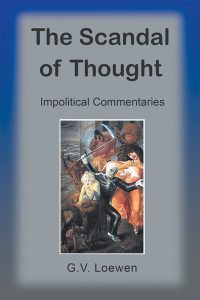
“Any institution that centers itself by reproduction is immediately suspect. Criticism, if directed at the unpolished edges of an organization, edges which either sabotage or yet defeat the institution’s ability to reproduce itself, can certainly be found in abundance. But critique, authentic and reflexive, that which calls into question not merely the goals of government or like edifices but indeed their very existence, is something surpassingly rare in our day. Even so, its improbability does not necessitate our own retreat into the impossible. The human imagination is more resilient than any political force. That it is more than impolite to pursue this other course gives a validity to the ‘impolitical’; at once uncouth and impolitic as it must be.” (From the book’s Introduction.)
The author’s third collection of critical essays points to the political crises of our times. His understanding of politics is more expansive than our general reaction to it. It is at once what we are, the “political animal,” the being who is only what we are through the historical consciousness of what constitutes culture and humanity, as well as one who acts within that history and toward a better self-understanding of that same consciousness, often immersed in ideology and submerged in popular consumption of both media and commodity.
With titles ranging from “Mein Banff” to “Why I am not an Olympian” to “Old World Mind, New World Machine” and others, it is clear that not a single word has been minced in this very pointed, yet highly thematic set of papers, essays, editorials, as well as an interview that offers a more personal insight into the author as a thinker and a human being.
Buy at Amazon
Buy at Barnes and Noble
Author and Wholesale Orders Click Here
Reimagining the Future
“A book like this should not exist. Its topic does not exist, nor does its experience. Yet it is too quick, possessed too much of the now to simply iterate the banality of speculation. Futurology is not futurity, and though it is true by definition that the object of the first remains unknown in the present, the experience of the second is, in fact, what we are. For our being is, in its essence, a being ahead of itself. It is at once always and already ahead ‘of’ itself in that its futurity is a necessity for its presence. We experience the future as a coming to be, as a tension between what we have known and what we could know.” (From the book.)
possessed too much of the now to simply iterate the banality of speculation. Futurology is not futurity, and though it is true by definition that the object of the first remains unknown in the present, the experience of the second is, in fact, what we are. For our being is, in its essence, a being ahead of itself. It is at once always and already ahead ‘of’ itself in that its futurity is a necessity for its presence. We experience the future as a coming to be, as a tension between what we have known and what we could know.” (From the book.)
In this, the final volume of G.V. Loewen’s phenomenological trilogy concerning how we experience the understanding of temporality in our lives, the very feeling of time passing, time lost, and time to come, it is the question of the future that animates its closing analyses. At once feared and desired, heralded and cautioned against, the future presents a challenge to human consciousness simply because it is, from the perspective of the present, both unknown and unknowable. It also cannot be located in the past, and not for any paradoxical reason; the past does after all contain hints of what is to come.
What is at issue is how to locate such moments and attempt to gain some insight from them. The meaning of the future can be said to be included in a human experience that does not close itself off to what it already imagines it knows, but at the same time must not presume to take the future into its own inevitably narrow embrace.
Buy at Amazon
Buy at Barnes and Noble
Author and Wholesale Orders Click Here
Represencing the Present
“And when we do perceive the wholeness of the present in its very presence – this is not at all to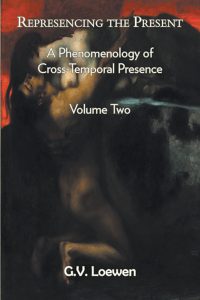 suggest that we regularly do so; all we have to do is consider when the last time was that we felt we had truly understood everything that could be known about this or that aspect of our existence or the world at large – we ourselves are enlarged, for a corresponding moment, in our consciousness. We know what it means to know something. We understand understanding, we apprehend apprehension. And this in turn does not rest within a subjective epistemology of motive or design. This is not a question of ‘how we know what we know’ because the ‘what’ in every such case remains unquestioned in itself. No, this is the ‘thing in itself’ that is understood and made conscious, insofar as it can be. In this case, what we apprehend and thence in turn what takes us in, is the very character of the present as both an experience and a time of one’s life, an historical period. The present is that which at once begins and transgresses.” (from the book)
suggest that we regularly do so; all we have to do is consider when the last time was that we felt we had truly understood everything that could be known about this or that aspect of our existence or the world at large – we ourselves are enlarged, for a corresponding moment, in our consciousness. We know what it means to know something. We understand understanding, we apprehend apprehension. And this in turn does not rest within a subjective epistemology of motive or design. This is not a question of ‘how we know what we know’ because the ‘what’ in every such case remains unquestioned in itself. No, this is the ‘thing in itself’ that is understood and made conscious, insofar as it can be. In this case, what we apprehend and thence in turn what takes us in, is the very character of the present as both an experience and a time of one’s life, an historical period. The present is that which at once begins and transgresses.” (from the book)
In volume two of a three-part study of the “phenomenology of temporalities,” G.V. Loewen analyzes the very conception of what is the now, of the moment, fashionable, de jour, and within the Zeitgeist all at once, utilizing ideas such as “retinution,” the “phantasmatic,” and “presentification” amongst others. In doing so, it is an ethics of the present that is revealed, one in which we find that freedom and salvation are opposed to one another; for in freedom, we are oriented in the present toward a future that does not yet exist, rather than toward a timeless realm that has always existed. Not only is this the truer source of the present’s conflict of values, but it also reveals the clue our species needs to reorient itself to at once attaining the promise of our collective history and the premise of its historical humanity.
Buy at Amazon
Buy at Barnes and Noble
Author and Wholesale Orders Click Here
Reintroducing the Past
“We have established what our general expectations of ‘the past’ are to be, given that it is our creation and thus it ‘owes’ something or other to us. It is at first motivated by resentment, tends toward reification, and divulges reconciliation. It has the character of a ‘space,’ it is something more ‘moral’ than we, and is also possessed of the variety of other traits, including it being a space of acts rather than action and also of the mystery of hiddenness. The past is, in its essence, something occlusive and worthy of inspection along this line alone. The query that begins all of it at this moment is simply, ‘why did this occur?’ To comprehend the presence of the past in this more radical manner – the object, especially if it is art, objects to us and thus as well to all of our nostalgic and romantic desires of it – we find we must engage in both memorial imagination as well as memorial recollection.” (From the book.)
creation and thus it ‘owes’ something or other to us. It is at first motivated by resentment, tends toward reification, and divulges reconciliation. It has the character of a ‘space,’ it is something more ‘moral’ than we, and is also possessed of the variety of other traits, including it being a space of acts rather than action and also of the mystery of hiddenness. The past is, in its essence, something occlusive and worthy of inspection along this line alone. The query that begins all of it at this moment is simply, ‘why did this occur?’ To comprehend the presence of the past in this more radical manner – the object, especially if it is art, objects to us and thus as well to all of our nostalgic and romantic desires of it – we find we must engage in both memorial imagination as well as memorial recollection.” (From the book.)
In this first volume of a three-part study, a phenomenology of how we understand the presence of time in the world begins with the question: How do we understand the concept of the past? This question has a number of aspects to it: What is “the past?” How does the past retain its presence in the present? What is the temporal character of that which no longer fully exists? And so on. This analysis attempts to capture the curious amalgam of memory, biography, and history, and subject it to the objection of the present. Herein, the dead must answer to the living inasmuch as the inverse has also ever been the case.
Buy at Amazon
Buy at Barnes and Noble
Author and Wholesale Orders Click Here
The Truer Trinity
“This was the truer source of Evelyn’s tears, that she couldn’t communicate with the dead. Been there, done that, she thought of human history. And wouldn’t you know it, contact, a second sun, a new world for humanity to live upon, none of that stopped history. Maybe time, for a moment, was stopped. The destruction of god and the devil both, the vanquishing of Seryxim, the loss of these two heroines for all time, the greatest beings who had ever lived.” (From the book.) 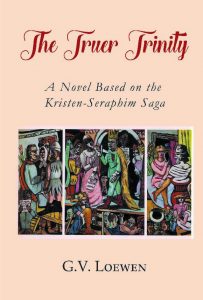
A decade after their momentous and cosmic victory, the heroes find themselves suffering from a collective mid-life crisis whose source may be equally cosmic. With one world leader seemingly suicidal and another about to step down, Kristen, Mike, Evie, Mary, and the entire rest of the legendary community are once again called forth into the newly dual void of transliminal space and time. Events soon overtake them, from a coup on the pioneer human world, a civil war in Tudor England and the threat of one on that felid, as well as the wider yet mysterious calling of those chosen to sacrifice themselves in an ultimate gambit. Who is to go? When and why them? But the truer conflict lies within, as Keeley must confront her predestined fate, Maevery and her new life-love Lynn must confront their dark world of origin, and Kristen herself must not only repay Kylie a debt but also a much larger one owed to her own predecessor. In a series of bizarre yet transcendent maneuvers, felid mates Smiley and Astridyx along with their human kin Smithers discover a way to enjoin the greatest possible reunion. The shocking idea that the sisters of fate could be brought back, at once seems like both the ultimate solution and the ultimate mistake.
“In a classic follow-up novel, Loewen’s now venerable pantheon are required to make one more tremendous effort to ensure not only the future of the galaxy, but possibly that of the entire universe as they know it to be. The flights of imagination needed to even begin to do either, take the heroes on their most visionary and dangerous journey yet. With the ethics of their actions often thrown aside, each of the saga’s principles must make choices that none of them would desire. The outcomes of these actions are at once horrifying and edifying, as the most celebrated and yet dreaded figures return in altered forms to face their own final fates. In doing so, none of their former friends remains untouched.” – Lynn Eddy, VP of Acquisitions, Strategic Book Publishing and Rights Company
Buy at Amazon
Buy at Barnes and Noble
Author and Wholesale Orders Click Here
On Time: Appointments, Schedules, Calendars, Deadlines
In a world where everything has its price, time often seems like the most precious  commodity of all. But at the same time, we are very good at finding ways to spend it, even waste it. As finite beings, we must ask: What is the nature of our conflicted relationship with time?
commodity of all. But at the same time, we are very good at finding ways to spend it, even waste it. As finite beings, we must ask: What is the nature of our conflicted relationship with time?
The author says:
“The confrontation between myself as an object in the world, the experience of subjectitude that I understand and live within due to this relationship with the world of objects and others as both subjects and objects, as well as my fragile sense of being myself in the world, a being both in time and place, is precisely where marked time occurs.”
Buy at Amazon
Buy at Barnes and Noble
Author and Wholesale Orders Click Here
Decalogue: A Novel of the Beginning
Do not love the dead. Do not hate the living. For life and world are one thing, and you are both, present in the second but the fullest presence of the first. 
Now the jaguar stood up and swaggered her tail back and forth. “Some of you might imagine that my speaking with you is a miraculous thing, or the work of an occult force. It is neither. It’s simply our new friend’s technology, discovered and sharpened in the same way that we make better cars than we used to; better, safer, more energy efficient. All of us benefit from that. It’s by way of these skills that we are what we are today. But I do want to say that in my experience of animating a part of nature, I am very aware that human’s use of the world has endangered it, taken it to the brink. It fills me with sorrow, something beyond my control to mitigate within this being. Animals do feel things after all. Not as we do, but they know pain, anguish even, though they know not its source. They don’t have gods and devils immortal, but they have come to know we humans as both.”
Latent within the all in all is something deeper that awaits its advent. Deeper, wider, darker and yet blinding as is the truth itself. A supernova of supernature. The legendary community can only themselves await it in turn. But as it gradually begins to show itself, through freshly painted Renaissance masterworks, through the consciousness of semi-alien children, through the distorted ambit of the felid dreamscape, and finally, through the culmination of the heroic team’s entire history, both Kristens, Seraphim, Mike, Smiley, Velvet and everyone else find themselves playing out the final scenes, with their own equally final fates to be forever decided.
From a reviewer: “The grand finale of Kristen-Seraphim overtakes all of its previous narrative in an unbelievable torrent of political and metaphysical action. The world transformation has begun, but on no less than three worlds. We expect to learn of ultimate things; cosmic truths, personal fates, the end of time and time anew, and the narrative answers to all of these. More than this, and most importantly, a new Decalogue literally commands us to act as we have never acted before.”
Buy at Amazon
Buy at Barnes and Noble
Author and Wholesale Orders Click Here
The Ennead: A Novel of the Ninth
“At some length Kristen managed some small revenge by grabbing onto Mary and fingering her little friend to a decent climax of her own, realizing only afterwards that Evelyn had been helping out from behind, as it were. Which then left the dark-haired mortal enemy of all that was evil in the world. Evie, the avenging angel, the fullest-blooded princess of the night; fearless, peerless, faultless. Yes, faultless, by gods. Blood lust be damned, I love you and my god I need you now. The both of you. Like never fucking before.” 
“In silence now, a silence made sacral and unforgiving at once by the ultimate act of compassion, so dreadful as to turn the tail of the finest warrior-cat, she found the place that mere demons would shun, requiring a grace they could never master. Seraphim nodded once to her would-be-wretched mother and closed her tail around her throat. Her mother smiled back at her, ruby orbs shining filial light into her own. That was something that would never, ever come again. But knowing I had it, knowing I was loved by them; well, that makes all the difference in the universe, doesn’t it?”
With Kris and Mike on the outs for the first time, Seraphim forced into a ritualistic reconciliation with her mate’s felid sister, Hedodronica, under the threat of Decamonican vengeance, and the first Kristen at a loss regarding her personal future, the heroes realize their collective task is far from finished. Martin must lead teams in search of the remaining liminals, and while Sir Robert finds himself being an interspecies mediator, Russian premier Kirisovsky and the felid diplomats attempt to contact aliens perhaps as old as the Earth itself. Not least, the first Michelle must manage her world-wide social revolution that their new friends, the felids themselves, have stated is crucial for both their worlds. But the true key for all concerned is how to regain their own humanity given everything that has already passed before them.
Notes one reviewer: “Between interstellar intrigues, metaphysical conflicts, sibling bonds, and lover’s leaps, book nine of the vast and deep saga has the reader immediately enveloped. Throw in elite car ads, shocking revelations about the origins of religion, stinging indictments from objective observers of the human condition and all of its failings, as well as the overarching architectonic task at hand—to rid the universe of mythopoetic persona and thus take control of human destiny—and one cannot afford to blink. The game’s never been as afoot, and as the cosmic mystery and adventure of Kristen-Seraphim hurtles ever onward, prepare yourselves for an ‘archaeology of the soul’ itself.”
Buy at Amazon
Buy at Barnes and Noble
Author and Wholesale Orders Click Here
Words are also Deeds – Essays in Public Ethics and Private Aesthetics
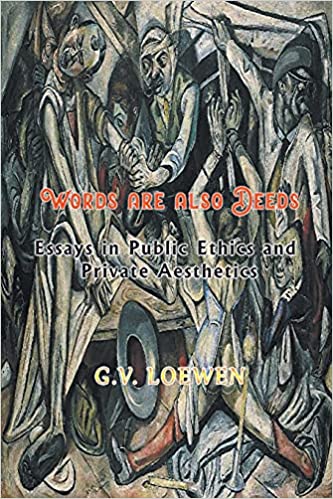
In the two dozen essays written over a nine-month span, from 2020 to 2021, G.V. Loewen attempts to cast the darkest denizens of our own dubious days into the less lurid chiaroscuro of cultural critique. The sense throughout that saying is also doing and that words thus carry a greater gravity than is often given them, should be kept in mind. For us, if the word and the deed are to be brought together, at once ethics and aesthetics must again be separated, if never to be utterly parted. They must travel beside one another, in mutual aid, but they cannot simply become each other, as they did during the period beginning with Goya and ending with Bacon, with the 1920s and 1930s reaching the high-water mark of this culture critique. For us, the ‘scandal of art’, as Paul Ricoeur has aptly put it, must indeed ‘balance’, or at the least balance out, the ‘scandal of the false consciousness’. But the scales upon which this confrontation occurs is held by the hand of ethics alone. [Adapted from the preface]
With compassion and criticism both, Loewen’s second collection of essays on Culture and cultures alike places the reader at the heart of contemporary existence. With titles such as ‘The Depth Psychology of Nervous Wrecks’, ‘Who was that Unmasked Man?’, ‘Rendering unto Caesar’s Palace’, ‘Gender: the ever-bending story’, and ‘Gandalf Hitler’, we are immediately aware that this heart is one of contradiction, conflict, even absurdity. In a word, it is wholly and irrevocably human, and it is to this humanity, much more realistic than anything either the PC or Neo-Con forces could ever muster, that the philosopher directs us. And we would be wise to attend.
On Being Ignored: And other necessities of the examined life
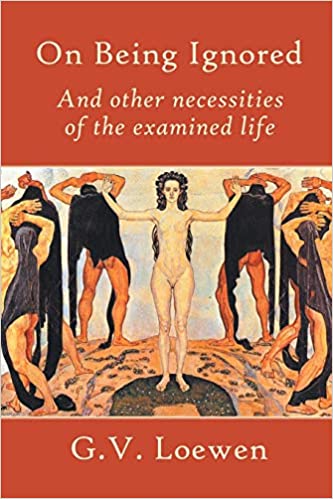
The critical social philosopher is the auditor-general of contemporary society and culture. These essays speak for themselves. Their content may be popular, but their reflections may not be. By promoting our abject failures as successes – my children respect me, our schools are superior, we love nature, we defend freedom, our God is great, and so on – we have found a way to bypass the critical reality check that the wider world around us would present.
We have found a way to escape the critical human freedom that is our universal birthright. This is where the auditor of the human condition, with only hope and a narrow glance to make him equal to that unreality, steps in. If the book’s essays and editorials have any merit, it must fall on the side of the world as it is, and not as we, with desperation and misplaced conviction, with jealousy and even rage, desire it to be.
In thirty essays and editorials written between 2016 and 2020, social philosopher G.V. Loewen examines some of our most pressing contemporary issues, finding that they are linked, inevitably and inextricably, with some of the most profound and perennial aspects of the human condition.
With wit, candor and compassion, these short analyses connect our often short-circuited attention to the deeper meaning of the state of the world, spanning the conflicts of nations, sexual identity politics, the climate crisis, global inequalities, the education and raising of children, and our understanding of the darker recesses of our own selfhood.
The Penumbra of Personhood: ‘Anti-Humanism’ reconsidered
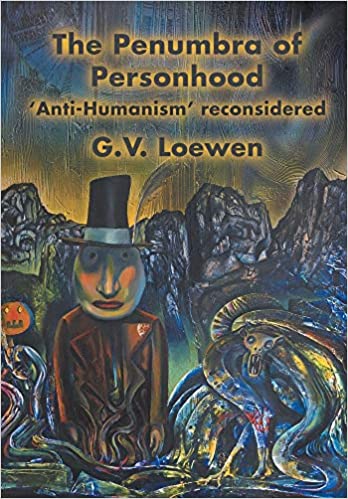
The drive to overcome nature is a projection of the anxiety about succumbing to our own nature. Inevitably, this conflict creates a vicious circle. For in subduing nature to our technical goals – themselves arranged so that our human frailty is to be overcome – we end up destroying the world in which we must live.
Of late, we have begun to recognize this viciousness, both in our acts and more profoundly, in our thoughts. Yet the attempt to lose our nature by losing Nature holds an even deeper conflict: “The most effective means of escaping spiritual trial is to become spiritless, and the sooner the better. If only taken care of in time, everything takes care of itself.” (Kierkegaard, 1844).
Social philosopher G.V. Loewen is the author of forty books on ethics, education, aesthetics, religion, health and social theory, and more recently, metaphysical adventure fiction. He was a professor in the interdisciplinary human sciences for two decades.
“The Penumbra of Personhood is not only the cumulative effect and expression of the primordial characters of Dasein, flung along with my being into the world,” writes the author, “it is also the most graceful and eloquent response to the unknown that we possess. It is, in its own thrown essence, the fullest divergence from any violence of the reactionary or technique of the manager. It is objectively what we are and thus what we have to offer our own time.”
Ironically, the State has to contend not with history, the writing of which it mainly controls, but rather morality, part of the pre-State metaphysics and a version of collective human vanity that also claims to be timeless.
If it is at first striking that even in our time, morality has retained such a hold, on second glance it is at least not surprising. It has ironically become the weapon of the private person, and this is very much against its own cosmogonical backdrop.
Morality is shared, as is belief that the one stems from the other, and in this they are quite unlike either ethics or opinion, also having become the pedestal upon which any demagogue can be placed. The uttering of a “higher law” betrays the moralist at every turn.
Even if the State can delicately navigate these potentially dangerous currents while affording to ignore mere moral editorializing – an inevitable whirlpool in any democracy at least – if enough “private” people recognize that their misgivings are shared, morality can once again assume a vestige of its former mantle. It becomes a rip-tide of conventional “wisdom” against which this or that elected regime may ride or be ridden over.
If this is the most vulgar expression of Dasein’s will to life, and even ontically, will to freedom, then it cannot be ignored by the reflective person. It is the final avenue of appeal in a rationalist social organization.
Equipped with its own divinity, morality finds that it still has some suasion in the courts, certainly within many families, and in the schools. It is society’s “back door man,” to use an old Blues phrase, to point up its consistent vulgarity.
Blind Spots
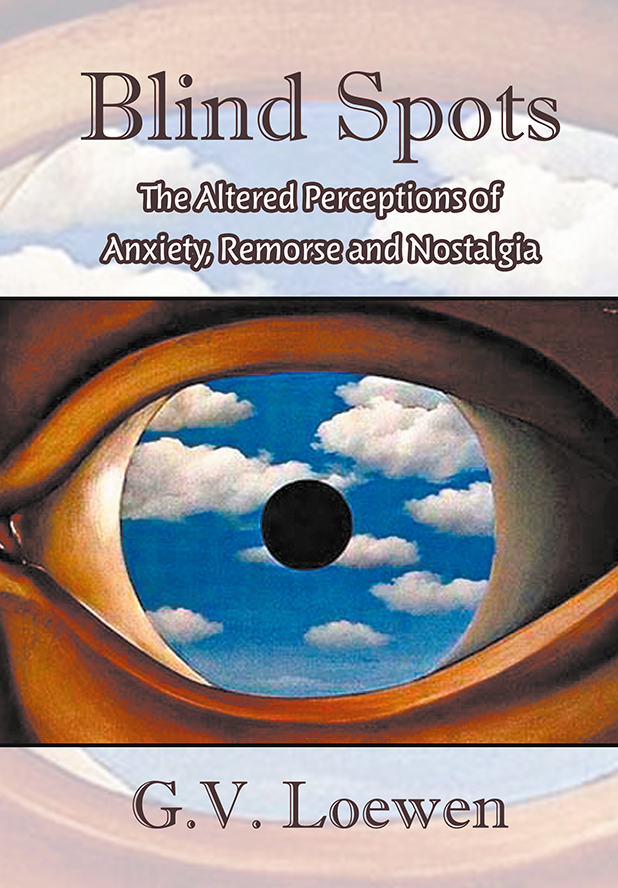
We ask of both ourselves and of our traditions, how does anxiety work? Why does it assail us in this or that place, but never in all places all at once? It is at once the Nothing of the existentialists, but it is more than that. Since it seems all too easy to be more than nothing, we need to immediately note that a capital “N” in Nothing is quite something after all. It is the very ardor of all that we never had; yet more so, all that we never could have. The zero sum of our failed endeavors is what we carry around within ourselves. The question of how anxiety works and does not work is at the very heart of the human experience. This is the question that is the subject of this book.
History has replaced morality. Not in point-to-point substitution, but in that something could be timeless, either in principle or practice. It’s likely that the old anxiety concerning one’s “fate” is now itself a mask. It is interesting to imagine that a metaphysical source of angst can be more comforting than a quotidian one. We are most intolerant of anyone who seeks to be as we are and have what we have, yet this too remains somehow a throwback to the previous age of caste, child chattel, and misogyny, so the soteriological sensibility remains compelling. It is, if anything, a much larger mystery than it was before. Now, and for the first time, we must save ourselves.
Halcyon Summer
Two lonely cynics are transformed by the sharing of forbidden love. Facing their respective demons together, they experience deep sorrow, but an even deeper joy.
Linked by the profound knowledge that comes from overcoming self-doubt, they ultimately confront a joint destiny that hurtles shockingly beyond their control. An alternative ending is also presented that testifies to the enduring beauty of their mutual self-discovery.
Halcyon Summer is Romeo and Juliet, Lolita, and Fifty Shades of Grey all rolled into one. Its blinding flash of scalding hot narrative will leave you stunned and breathless.
“In his controversial novel, Halcyon Summer, author G.V. Loewen pushes the limits of the nature of love, offering the reader a romance between a thirty-five-year-old man and a fifteen-year-old girl. The Lolita-esque tale presents a genuine relationship built on trust, care, and tenderness, but all the while existing under the shadow of moral and social outrage … we see the author’s self-awareness, his careful approach to this taboo project that allows it to function as almost a social and literary experiment.” – Charles Asher, Phi Beta Kappa Reviews
“”Halcyon Summer turns from a steamy story of sexual exploration to a serious survey of how relationships grow despite great differences and even (perhaps, especially) under conditions of adversity … especially recommended for leisure readers interested in how romantic connections are made and evolve.” – D. Donovan, Senior Reviewer, Midwest Book Review
Life Worthy of Life – A Novel of Fulfilment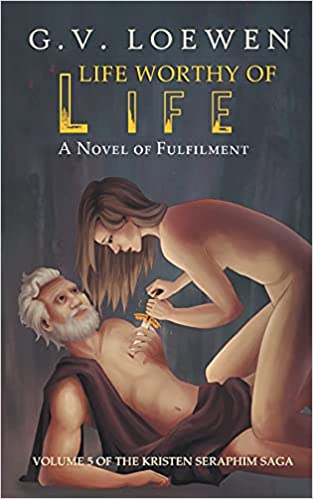
With a decaying corpse washing up on a secluded beach, and a woman from the Renaissance era flinging an infant off the cliff above it, the heroes know they are in for a death-defying journey that will embrace the very source of death itself.
The origin of human darkness in their world is actually an entirely other world, replete with soulless duplicates of themselves, ready to conquer and enslave everything they previously fought for and loved.
Such is the life they would bring upon this world, that the legendary team must confront the true stakes of their ongoing conflict.
With Smiley and Seraphim now squarely on their side, and a naïve but gutsy police captain, whose induction into the cabal’s deepest secrets opens the heroes to a wider reality, multiple soul-searching sacrifices are in store, including no less than the ultimate murder.
Says the book’s publisher: “The second Kristen comes into her own in the next transfixing installment of the Kristen-Seraphim Saga, but this at a higher price than any of her comrades would have guessed. As deeply troubled as the heroes of this radical de-mythology of myth find themselves, readers will both mourn and rejoice with them at every turn of the existential table round which the entirety of the human future is to be decided.”
Life Worthy of Life is book 5 of an 11-volume epic.
Ex Spiritus Mundi : A Novel of the Depths: Volume 6 of the Kristen-Seraphim Saga
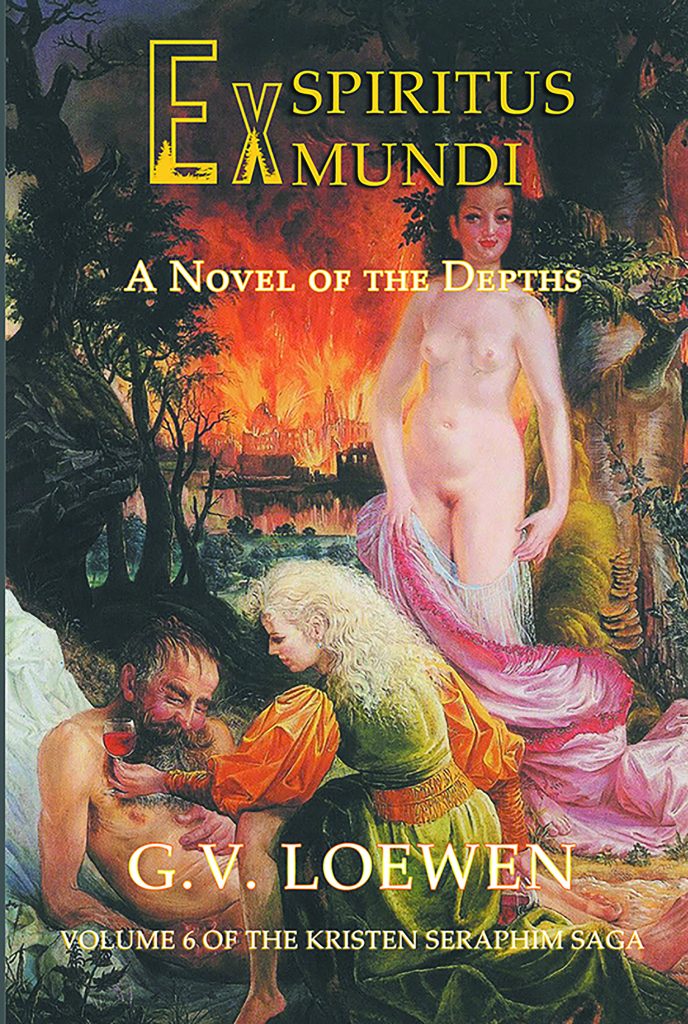
“Does it matter? You can read the message we’re sending out.” Kristen was now suddenly bored. Tired out. Killing was not really her thing. She didn’t enjoy it, like Evie, and she didn’t remain unaffected by it, like her sister. She wasn’t much good at it technically either, like Mike. It didn’t give her something to hang her hat on, like it had for Kylie for a while. And shamefully, she felt little remorse in it, even after all the other possibilities had been barred to her. Unlike Mary. No, she was most like Michelle. Maybe that’s why her successor had actually fallen in love with the second Michi. Well, she had left them together with their fashion photographer who used to also be hers and hers alone. Kristen suddenly felt quite lonely. ‘Kriss’, double-s, that’s who I am now. No, it wouldn’t do. It was ludicrous. She was still Kristen, just the one that now no one needed. Except for her sister. That was really the key to all of this horror after all. Loyalty to her beloved sister, making up for all of her cowardice she’d shown back in their family home worlds ago.” (from the book)
Faced with both staggering reincarnations and canny returns of those the heroes never expected to see again, their post-sacred community comes apart through conflicting loyalties and the questioning of their faithless faith. What is love? What is freedom? What is friendship? And what, most importantly, is trust?
The Number of the Best—A Novel of Ourselves : Book Eight of the Kristen-Seraphim Saga
“You don’t need lauding, Kristen Anne. Good fucking Christ, didn’t you get enough of that at school? And then who takes up with Mr. Perfect, letting yet more time slip by before you even thought to look for me? And then when your precious friends pushed you to confront your bad conscience, you did everything you could to avoid it. I know, sister. We merged, right? I know everything about your feelings regarding me. Then when I thought we were tight, when we were dancing in the blood of our enemies together, raking them with no stopping us, you lied to me, there on the roof-top of that unholy school. I should have killed you then and there.” Seraphim declared coolly.
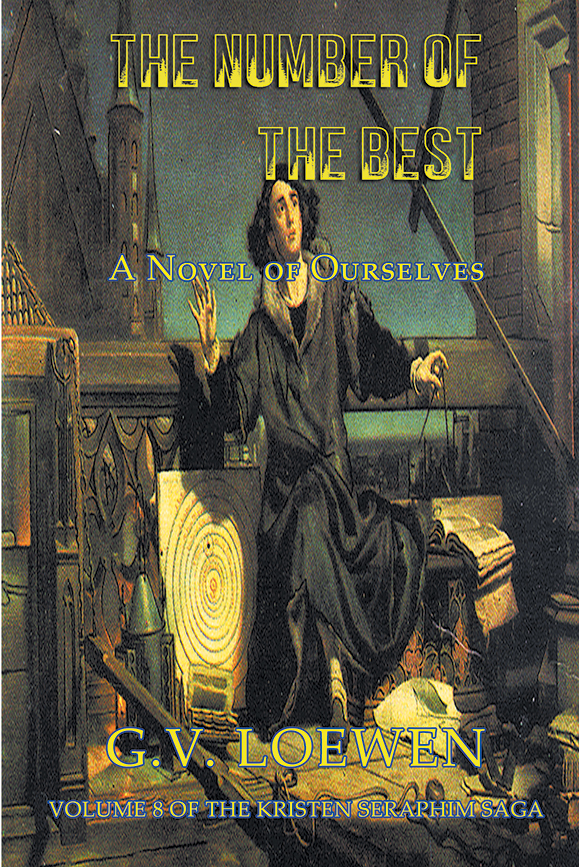
“And saved me the torment of doing it myself.” Her sister softly replied.
Not many people yet realized that the self who dreams is not the same self who then wakes and lives out the day, day after day. And in such dreams from which we do awaken – and indeed, there are those additional to the unconscious from which we never again emerge – what, perchance, remains of the days within which all dreams come to grief? (From the book.)
Imagine yourself set down indeed. In volume eight of Kristen-Seraphim, we follow the startling itinerary of the six only partially human heroes who had left Earth for points unknown at the end of the previous arc. The two sisters of fate find that the wider, cosmic mystery centers around their most intimate acts, that Smiley’s alien kinfolk are only half-glad to welcome him home, and that their bare survival will require of them all of their skills and genius, metaphysical and otherwise. It will also require their shocking return to the world they had all once believed was their truest home. In turn, the remainder of the legendary community is forced to awaken from an unexpected dormancy to provide the epic narrative with its most astonishing climax yet.
According to one reviewer, “A stunning display of imaginative discourse, this first full-length novel of the ever-widening saga will appeal as much to adult readers, given its ingenious plot devices. ‘The myth that myth is dead’ animates the narrative and gives it a life beyond its own storytelling. More than this, we now understand for the first time the true relations amongst the principals, their origins, and perhaps also a nascent sense of their destinies, as well as perhaps our very own.”
The First and Last Science : A Novel of Thinking: Volume Seven of the Kristen-Seraphim Saga
“The back-stage people must be so used to not only seeing beauty but also constructing it that they never seemed to even glance at Kristen and the other models. But with Michelle it was different. With her, one didn’t see beauty, but rather felt oneself in the presence of the Beautiful itself. The truth of beauty. For a long while, in human consciousness, beauty, truth and the good were so associated with one another as to be the same thing. Hah. Well, we now know that beauty can be deceptive, the good situational, and the truth as ugly as hell.”
And the truth is about to get a lot uglier than even the veteran heroes could have imagined. With the now sisterless Seraphim returned and out for the blood of the world, with the inhuman future of sentient machine-souls archiving the vast billions of surplus spirits washed up on their post-historical shores, and with the major nations of the world gutted and paranoid, the beloved comrades embark on a climactic series of adventures that will take the very presence of the future to resolve the future of the present.
Completing a major narrative arc for Kristen-Seraphim, book seven careens forward into the very crucible of human vanity and desire: immortality. That the enduring cast and crew that readers have come to know take into their ambit the world leaders themselves, is not even the most stunning event. The heroes had never known exactly what their lives really meant, thus providing the truer mystery that must be solved, lest all, including themselves, be lost.
Author Bio

G.V. Loewen is the author of over 40 books in ethics, aesthetics education, and other areas, including metaphysical adventure fiction. The author is originally from Victoria, British Columbia, and some of the book is based there. A professor for 25 years, the author retired in 2018.

